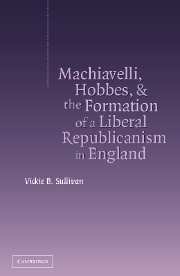Book contents
- Frontmatter
- Contents
- Acknowledgments
- Introduction
- PART I THE FOUNDATIONS OF LIBERAL REPUBLICANISM
- PART II THE FORMATION OF THE SYNTHESIS
- 3 Marchamont Nedham and the Beginnings of a Liberal Republicanism
- 4 The Distinctive Modern Republicanism of James Harrington
- 5 Henry Neville's Proposal for a Republic under the Form of Monarchy
- 6 Algernon Sidney as Anticipator of Locke and Secret Admirer of Machiavelli
- 7 Cato's Thought as the Reconciliation of Machiavellian Republicanism and Lockean Liberalism
- Conclusion
- Works Cited
- Index
7 - Cato's Thought as the Reconciliation of Machiavellian Republicanism and Lockean Liberalism
Published online by Cambridge University Press: 17 August 2009
- Frontmatter
- Contents
- Acknowledgments
- Introduction
- PART I THE FOUNDATIONS OF LIBERAL REPUBLICANISM
- PART II THE FORMATION OF THE SYNTHESIS
- 3 Marchamont Nedham and the Beginnings of a Liberal Republicanism
- 4 The Distinctive Modern Republicanism of James Harrington
- 5 Henry Neville's Proposal for a Republic under the Form of Monarchy
- 6 Algernon Sidney as Anticipator of Locke and Secret Admirer of Machiavelli
- 7 Cato's Thought as the Reconciliation of Machiavellian Republicanism and Lockean Liberalism
- Conclusion
- Works Cited
- Index
Summary
As influential as Sidney's thought was in America before and immediately after the Revolution, that of John Trenchard and Thomas Gordon, the authors of Cato's Letters, was even more so. “Cato” also surpasses Sidney in his public adoration of Machiavelli. Whereas Sidney is calculatedly circumspect in referring to Machiavelli, Cato exhibits no compunctions about associating himself with the Florentine; he has frequent recourse to the Florentine's thought, frequently names his source, and even refers to him as a “great authority” (16.121). Because Cato's influence was so wide and because he so overtly appeals to the thought of Machiavelli, it is necessary to ask what principles Cato derives and propounds from the Italian. Do his frequent appeals to the writings of this Renaissance thinker underscore his dedication to civic humanism and classical republicanism, or do they reveal, instead, his attempt to participate in a new and modern understanding of government and of the individual's place within it?
Given the immediate circumstances of the publication of Cato's Letters, it is all too easy to accept the notion that they are expressions of the former – of a nostalgic longing for a lost world of virtuous dedication to the homeland. The letters, which took the form of a series of articles that appeared in the London Journal and the British Journal from 1720 to 1723, originate as a response to the crisis of the South Sea Company.
- Type
- Chapter
- Information
- Publisher: Cambridge University PressPrint publication year: 2004



